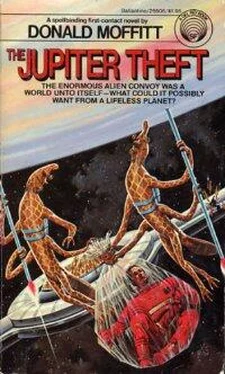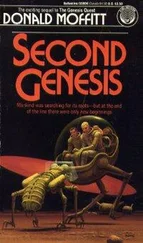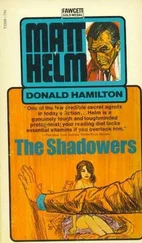A first-magnitude star suddenly bloomed between the planet and its moon.
Almost at the same moment, an enormous whirlpool of hydrogen clouds began to form on the side of the planet facing the star.
Maybury blinked, unable to believe her eyes. Meteorological phenomena thousands of miles across just didn’t develop in the space of a few minutes!
She looked across at Sorg and hesitated. She really should call Dr. Mackie at this point. If anything interesting was developing, she’d probably be shooed out of the booth. That’s the way things had been going at Farside since Dr. Ruiz had left. Her small jaw tightened stubbornly as professional pride took over. Sorg, lounging against a console, hadn’t noticed anything. She punched her queries into her lightpad and thumbed them into the computer.
Data began to dance across the lightpad; she had told the computer not to duplicate the display on any of the data boards. She watched for several minutes, then set the computer to continuously monitor the planet’s position against the solar orbit the observatory had plotted.
Sorg was sauntering over in her direction. She looked down into the photoplastic plate—hooded to keep out stray light—and gasped.
The new star was moving.
It was moving fast enough for the eye to see—about as fast as the second hand on an analog-style watch. From its initial position of about three planetary diameters from the Cygnus Object, it crossed in front of the planet.
It wasn’t a star. It was something bright in orbit around the planet. A pinpoint of brilliant blue-white light.
She did a quick mental calculation, timing its passage across the face of the planet. It covered the 8,000 miles in twelve seconds.
The thing was whipping around the shrouded planet at something more than two million miles per hour. And it was picking up speed. It winked out as the planet eclipsed it. The eclipse lasted some nine seconds.
It was accelerating at—her forehead wrinkled with disbelief—at a rate equal to tens of thousands of gravities! And why wasn’t it flying into a higher orbit? What tremendous force could be tying it down like that?
There was something else. The whirlpool of clouds was moving across the smudged face of the planet, following the moving star. She tried to imagine what a hurricane with winds of more than two million miles per hour would do to a landscape.
She reached for the communicator button. A hand slapped down over it before she could press it.
“What are you doing?” Sorg snapped.
“I’m calling Dr. Mackie,” she said. “Now get your hand off that button.”
Mackie took twenty minutes to arrive. By that time, the orbiting spark was whizzing round and round too fast for the eye to follow. It looked like a hoop of glowing wire around the planet—a ring of etched light.
The hydrogen whirlpool was no longer distinguishable. In its place was a blurred white band girdling the planet. The rest of the cloudy surface seemed to be seething violently.
And if you looked closely, you could see a rim of ghostly spider webs connecting the planet’s blurred belt with that strange shining halo. The effect was nothing at all like Saturn’s rings. It was a totally unfamiliar phenomenon.
“What’s this, what’s this?” Mackie fussed. His tone seemed to accuse her of being responsible for something untoward.
She tried to tell him about the circling spark that was responsible for that ring of light, but he dismissed her impatiently. He pursed his lips disapprovingly when she attempted to explain about an acceleration of hundreds of thousands of feet per second per second. He wouldn’t believe it until he’d resurrected the vids himself from the data banks.
But he didn’t kick her out of the booth, and she was grateful for that. There was a lot of work to do, and the two of them got busy. Neither of them noticed when Sorg slipped from the room.
Maybury worked straight through the end of her shift, and stayed on with the extra people Mackie had called in to help. He kept them all very busy with visual observations; spectra and bolometer readings—becoming very excited at the rise in surface temperature detectable over the next few hours, caused, most probably, by the scouring friction of those million-mile winds.
But it never occurred to him to recheck the planet’s solar orbit. Maybury finally was able to get his attention long enough to show him the numbers still unreeling on her lightpad.
“Good God!” he said, when he finally assimilated it. “I wish Ruiz were here!”
There was no doubt about it. The planet from Cygnus was moving again.
It was a course correction. It was against all the rules of celestial mechanics. Not even the powerful gravitational tug of Jupiter could account for the planet’s being torn from its solar orbit that way.
Mackie made everybody drop everything and apply themselves to this new phenomenon. So he was caught flat-footed ten hours later, when the wire hoop of light flickered and faded and became a spark again—a spark that slowed over the next twenty minutes and then abruptly extinguished itself.
The planet and its blistered moon had stopped changing direction. They were hurtling along a new path, but one that obeyed Newton’s laws of motion.
Maybury stood on tiptoe and peered past Mackie’s stooped shoulders to the viewplate. Mackie had plugged in the Sagan reflector, with Kerry’s assent, and the view of the planet’s disk was magnificent.
The face of the planet lay bare: a smooth rocky desert shorn of its hydrogen clouds except for a few wispy remnants.
It was dead now. That was the inescapable impression you got, looking at it. It had roused itself briefly and mysteriously, and now it was an inert ball of cooling rock.
But that last burst of effort had done its work.
Maybury tiptoed away and asked the computer for an entirely unauthorized projection of the planet’s new trajectory. The answer made her gasp; she’d have to show it to Dr. Mackie as soon as she could tear him away from the viewplate.
There was no doubt about it.
The planet from Cygnus was going to go into orbit around Jupiter.
* * *
Ruiz fed a newdollar into the slot and fidgeted impatiently until a holofax dropped into the tray. The news machine in the beachfront refreshment pavilion was the only one he’d been able to find in the whole government rest camp, except for the one in the lobby, and he didn’t feel like walking across a quarter mile of hot sand to get there. Workers who were lucky enough to rate a free vacation on the Nevada coast weren’t much interested in news of the outside world.
For Ruiz it was different. He chafed at the long absence from his work. It was exasperating not to know what was going on with the Cygnus Object—except for the sanitized snippets of information released to the general public. It was exasperating—and humiliating—not to be able to get through to his former colleagues on the Moon; there was always some “difficulty.” Oh, they were sugar-coating his enforced sabbatical, with make-work assignments and the lecture obligations that they’d discovered in the small print of his contract, and privileged holidays like this one. Until the government figured out what to do with him.
He was an embarrassment. The government didn’t like to admit mistakes. Ruiz was a leftover mistake.
The mistake had begun when they put him under house arrest almost as soon as he stepped off the Moon shuttle. The end of the world was politically sensitive information, it seemed. They just didn’t trust him not to blab.
Now that it appeared that the world wasn’t going to end after all, they didn’t trust him to cooperate with the cover-up, which was in full swing now. It wouldn’t do at all to let a powderkeg population of a billion know that their government had suppressed doomsday. Ruiz had too crusty a reputation. It was safer to have a poor frightened hack like Horace Mackie in charge of the crucial flow of information at Farside.
Читать дальше












